Part 3: Organisational health and capability
We need a strong foundation of skilled people working together in a well-run organisation to ensure that we can achieve our outcomes, impacts, and outputs.
Our people
We will continue to recruit a number of new staff each year. Some of these will be experienced professionals – replacing those who have left us – but we also hire a number of accounting graduates. We expect to see our staff develop both their vocational and leadership expertise, strengthening their contribution to the Office and the public sector.
We will continue our focus on each individual's needs in developing skills identified in our competency frameworks, on our leadership development programmes, and on improving the level of engagement of our people (as measured by our annual staff engagement survey). We use a number of indicators to measure the engagement, capability, and effectiveness of our people, and we aim to improve or at least maintain these results during the next three years.
Our people and their skills are in high demand among domestic and overseas organisations. We will continue to work on our staff-retention activities and also continue to recruit experienced staff from within New Zealand and overseas. Turnover is influenced by the New Zealand economy, and by the worldwide demand for qualified auditors. During recent years, our turnover has been as high as 23%, falling to a low of around 11% after the global financial crisis. In the last year, this has stabilised somewhat to between 15 and 20%, and overall we are comfortable with this level.
Equal employment opportunities
The Office's programme for addressing equal employment opportunities is through its recruitment and employment policies. Our recruitment programme aims to attract and appoint the best people, who have the appropriate skills, values, and attributes to meet the Office's needs, objectives, and strategic direction. We recruit in a manner that provides equal employment opportunity to Māori, women, ethnic or minority groups, and people with disabilities.
We note that our recruitment reflects the increasingly diverse workforce in New Zealand, with a greater representation of people from Asian countries in particular. We expect that this trend will continue.
Recruitment and employment decisions and practices (such as feedback from exit interviews) are monitored to confirm that policies are applied. Managers are made aware of, and given support to fulfil, our good employer obligations through specific programmes and courses and one-on-one coaching.
Business practices
We have an extensive quality assurance programme for all our outputs and services. Although this programme indicates an acceptable level of quality, we will continue to work on improving the quality of our outputs and services.
Our internal audit function uses the services of an external expert to advise our management team on the internal audit programme. The internal audit programme is agreed to by our independent Audit and Risk Committee, which provides oversight of the programme's outcomes.
Facilities
The Office received additional capital funds in 2011/12 to fit out replacement premises for our staff in Wellington, allowing us to consolidate all Wellington staff into one location. The refurbishment of 100 Molesworth Street is now well advanced and we expect to complete the relocation of all staff by the end of 2012/13. Auckland staff were successfully relocated into newly refurbished premises in July 2012.
Our Christchurch staff have been working in unsuitable temporary offices since the February 2011 Canterbury earthquake. After extensive searching for suitable premises, an agreement has now been signed to lease space in a new building on the outskirts of Christchurch's CBD, and we anticipate our Christchurch staff will relocate to this building in August 2013.
Information systems
To ensure an effective, efficient, and customer-focused service, our audit staff working in the field use laptop computers running specialist auditing and remote access tools. By the end of 2012/13, we expect to have completed a major upgrade of the laptops' software as well as an upgrade of the specialist audit tool. We expect that the upgrade will also contribute to improvements in the efficiency and effectiveness of our auditors in their fieldwork.
We anticipate implementing phase one of our Enterprise Content Management system (ECM) in 2012/13. This new system will allow the collection, storing, analysis, sharing, reuse, and reporting of the information the Auditor-General and her staff and Appointed Auditors collect during their work. We recognise the significant value this information and insight could bring to improving the performance of the public sector, and we intend to make the collection, analysis, and use of this information and insight as effective and efficient as we can. Enhancements to the ECM are anticipated in future years to keep pace with the changing information management environment.
We summarise our measures and standards for organisational health and capability in Figure 27, and show details with our previous performance in the pages following Figure 27.
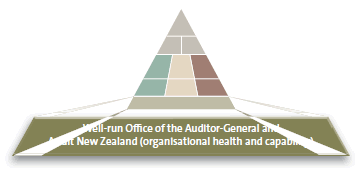
Figure 27
Summary of measures and standards for organisational health and capability
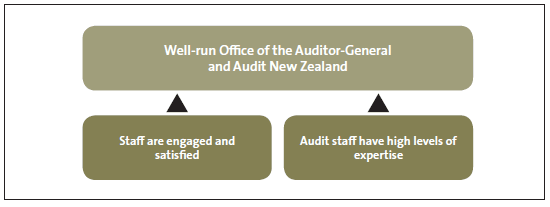
Measures and standards and previous performance, for organisational health and capability
| Staff are engaged and satisfied |
| Measure: Improve (or at least maintain) the engagement and satisfaction of our staff, measured against the previous two years. Comment: The Office's staff engagement survey is based on responses to statements on a 5-point scale, with 1 being the lowest score and 5 being the highest. Results: Results for the previous four years are shown in Figure 28. |
Figure 28
The Office's staff engagement survey scores
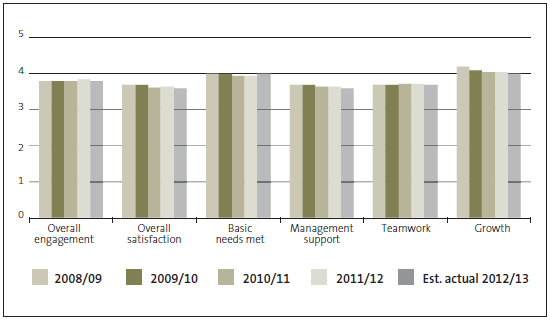
| Measure: Improve (or at least maintain) the average years of experience of our staff, measured against the previous two years. Results: Results for the previous five years and the target for 2013/14 to 2015/16 are shown in Figure 29. |
Figure 29
Average number of years staff have been employed by the Office
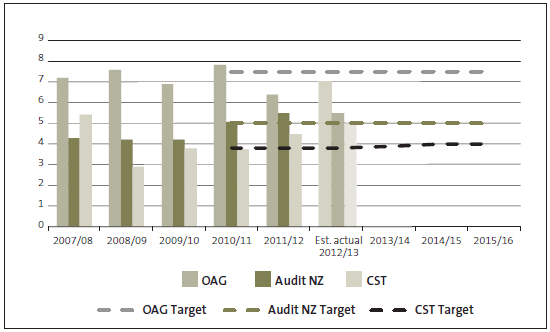
| Audit staff have high levels of expertise |
| Measure: Achieve a pass rate by staff undertaking accreditation examinations of not less than 95%. Results: Results for the previous five years and the target for 2013/14 to 2015/16 are shown in Figure 30. |
Figure 30
Percentage of audit staff passing NZICA accreditation examinations
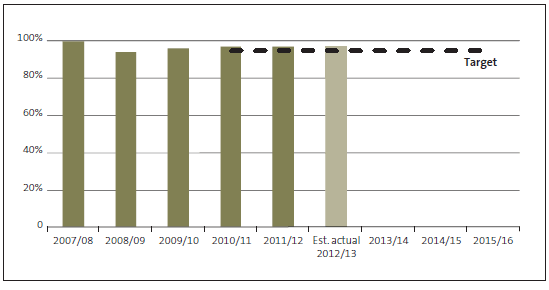
Measure: Client survey feedback shows that auditors' knowledge of entities' business and operating context is improving, and that auditors are investing in work to understand that context. Our clients give us improved (or at least maintained) ratings (on a scale of 0 to 10) compared with the previous two years for their auditors':
|
Figure 31
Ratings for expertise of Audit New Zealand staff
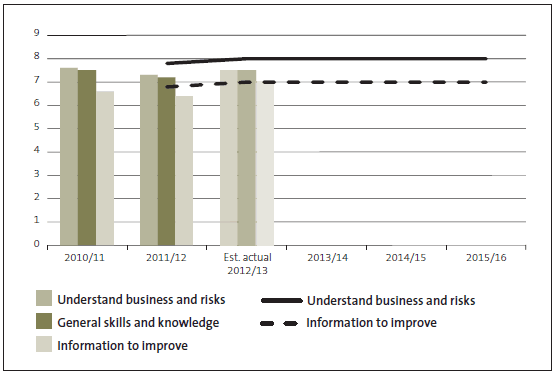
| Audit staff have high levels of expertise: Auditing performance information |
| Measure: Our quality assurance reviews of our audit and assurance work confirms that auditors are carrying out the requirements of AG-4 (Revised). Comment: AG-4 (Revised) is the Auditor-General's revised auditing standard on auditing non-financial performance information. Results: For 2011/12, quality assurance reviews of our audit and assurance work confirmed that auditors are carrying out the requirements of AG-4 (Revised). The reviews identified some areas where the audit of this information could be improved in future. During 2010/11, a quality assurance review was carried out of a selection of local authority audits, the first sector where we applied AG-4 (Revised). The review found that auditors understood the new requirements and were suitably trained to audit performance information in keeping with AG-4 (Revised). |
